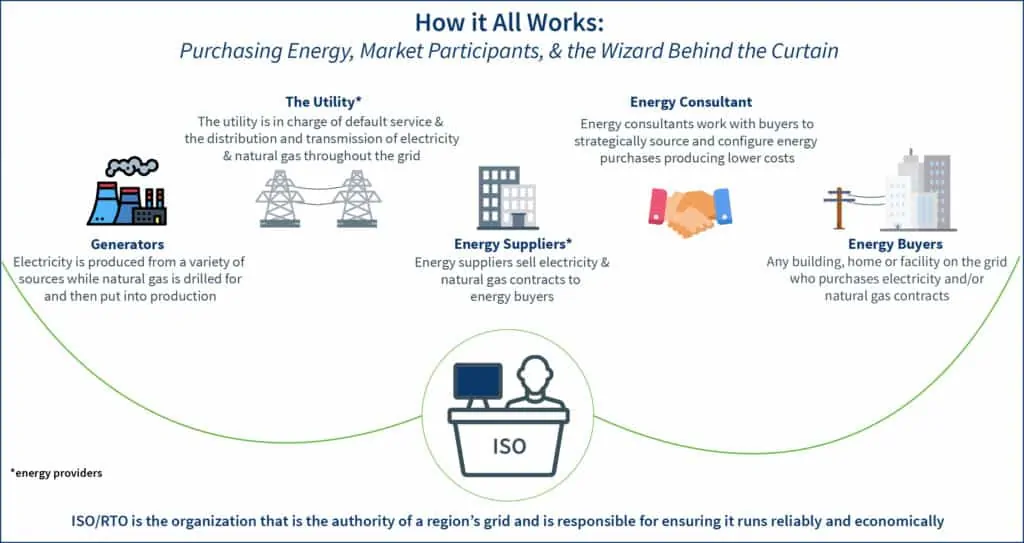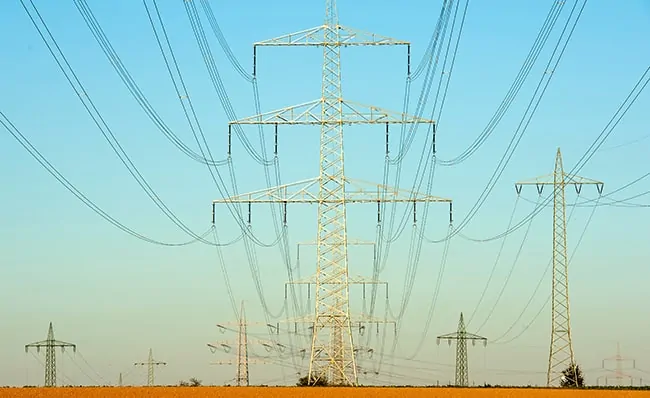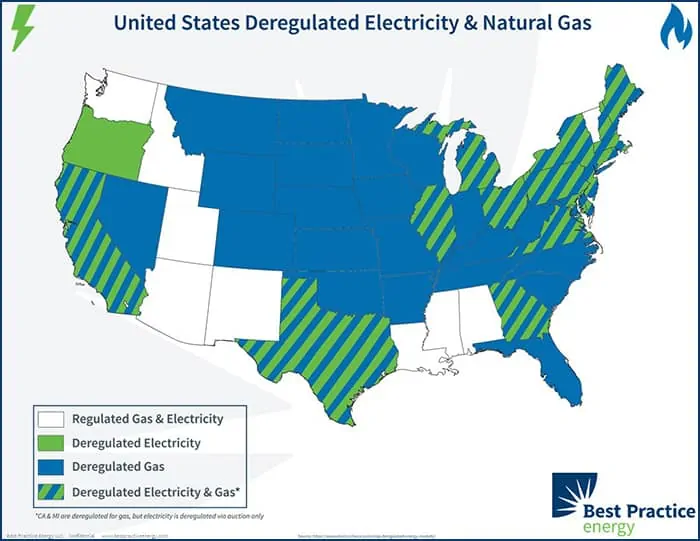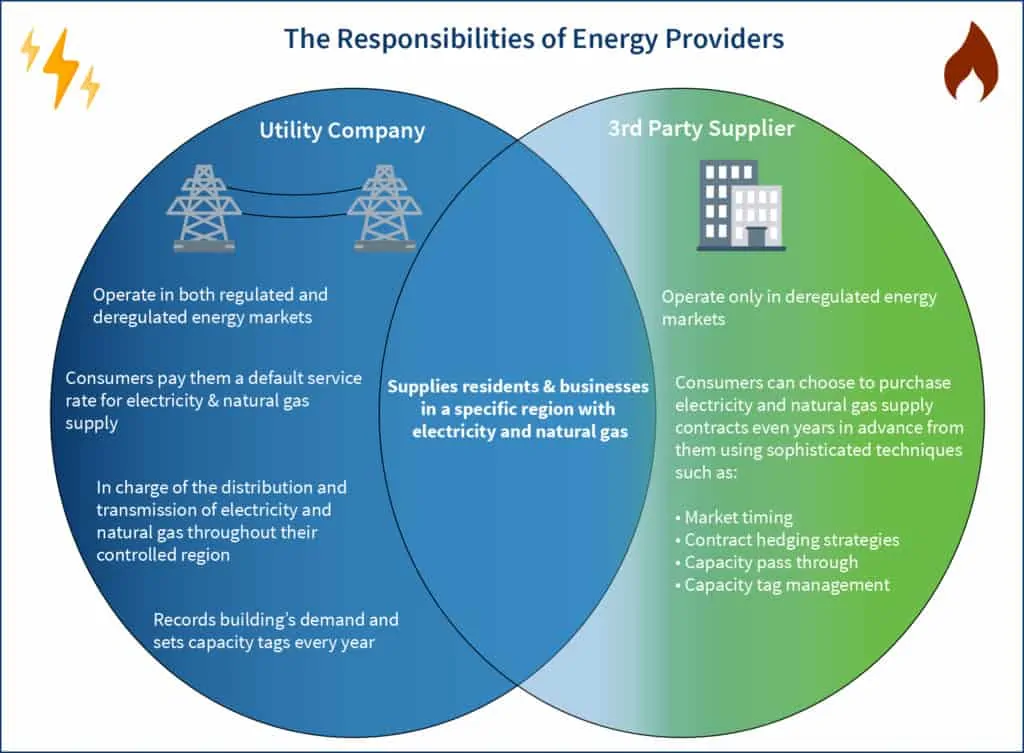If you buy energy, you’ve undoubtedly heard the term ‘utility’ or ‘supplier’ when referring to who you purchase your electricity or natural gas supply from.
While many confuse these terms to be carbon copies of each other as they are both energy providers, they represent very different types of entities. Deciding who you purchase your energy supply from is an important decision that should be influenced by an understanding of both types of energy companies.
Read on to find out the difference between utilities & energy suppliers and which is the right choice for your business’ needs.
What is an Energy Provider?
An energy provider is a company that you purchase power and natural gas supply from. These companies purchase wholesale energy like electricity and natural gas from generators and sell it to residents and businesses in the area that they are licensed to sell in.
There are two main energy providers residents and businesses in deregulated energy states can choose to purchase their power and natural gas supply from: A utility and an energy supplier.
What is a Utility Company?
Utilities are the default providers of electricity and natural gas to businesses and residents on the grid.
This means that if you live in a deregulated state and you don’t choose who you buy your energy from, your building will automatically be enrolled into a program called ‘default service’ or ‘last resort service’, which is provided by the local utility. This is the only energy supply option for buildings in regulated states.
While utilities do provide the default service to many buildings and homes on the grid, their responsibilities, and primary source of revenue, extend beyond simply providing default energy supply rates.
A Brief History of the Utility
In the days before energy deregulation, utilities were government-operated entities. They were the one-stop-shop for everything energy as they would handle both the generation and the transmission & distribution of energy throughout the grid as well as the billing of customers.
During these times, customers didn’t have a choice for where they bought their energy from so they would just automatically be enrolled in default supply rates by the utility in their region, often a very large geographical area. This eventually resulted in utilities becoming monopolies that provided inconsistent customer service and expensive energy rates since they didn’t need to worry about business competition.
One of the many driving forces behind energy deregulation was to break up these utility monopolies and provide citizens competitive supply rates for their energy.
Once deregulation began to take hold in states, the federal government began selling many of its utilities to private businesses. When a private company took over one of these government utilities, the Public Utilities Commission (PUC) put rules and regulations in place to ensure they performed all of their required duties.
Today, contrary to popular belief, most utilities are run by private companies and not the government. These private companies don’t even have to be part of the United States: One of the largest utility providers in the country is National Grid and they are headquartered out of London, England!
What Does the Utility Do?
Natural gas and electricity utility companies have many duties that extend further than simply providing default energy service rates to residents and businesses. While most no longer have anything to do with the generation of energy, perhaps their most important job is to manage the distribution and transmission of electricity and natural gas throughout the entire grid.
Electricity and natural gas utilities own a large portion of the electrical towers, lines, wires, poles, transformers, and gas infrastructure that transmit and distribute electricity and natural gas throughout their controlled region. They are responsible for the maintenance and reliability of this infrastructure and are the ones who restore power after emergencies as well as repair gas leaks.
Utilities are also in charge of checking electricity and gas meters to record information about usage. When peak events hit and demand skyrockets across the grid, the utility is the one who records a building’s demand, which is used to set capacity tags!
In states where energy is deregulated, all energy providers create a competitive environment in which they compete for the supply costs of buildings on the grid while the utility serves as the default provider (or last resort supply) for buildings that choose not to shop around for energy supply.
What is an Energy Supplier?
An energy supplier, often referred to as retail energy providers, alternative suppliers, or third party suppliers, is another type of energy provider.
These providers are licensed to supply retail electricity and/or natural gas contracts to buildings in deregulated markets.
They are different from utilities as they do not have anything to do with the transmission and distribution of energy. The place in which their goals overlap is in the supplying of energy to consumers.
At a high level, third party suppliers purchase electricity or gas from generators and sell the access to it to residents and businesses in their area. They market and sell their electricity and natural gas supply directly to customers in the form of contracts. These contracts last for multiple years and allow businesses to employ different strategies while purchasing.
In deregulated states, energy buyers can often choose between a variety of different suppliers, which creates competition and drives prices down significantly.
Which is Right for Your Business: the Utility Company or a Third Party Supplier?
The main difference between these two types of companies is that utilities are responsible for the transmission and distribution of energy as well as supplying energy to customers in the form of default service rates. The only duty of energy suppliers is to provide energy contracts to customers.
It really all comes down to price and how to purchase.
If you live in a deregulated state and don’t choose where you purchase your energy from, you are put onto utility service. This isn’t ‘right’ or ‘wrong’, however, it doesn’t allow you to purchase your electricity or natural gas with a strategy; you are at the mercy of the default rate set by the utility.
Energy deregulation began as a way to break up utility monopolies and give citizens access to competitive energy rates from multiple providers. By purchasing through an third-party energy supplier, you are taking advantage of energy deregulation.
Buying through an energy supplier provides you a plethora of options for how you purchase your electricity or natural gas contracts.
By working with a broker or consultant when buying through a supplier, you can optimize your contract by utilizing a variety of purchasing strategies that are tailored to your business. Purchasing in an intelligent way like this is what can result in hundreds of thousands saved in cost avoidance.
Competition between suppliers also drives prices down a consumer’s price. When you use a broker to shop your load in the market, suppliers compete with one another for your load and lower their rates in order to win the contract.
There are many factors to consider when deciding who to purchase your electricity or natural gas from. However, cost mitigation is the main focus of most energy buyers.
If you’re on default service and not concerned about the price you pay for energy, there is no reason to not stay on the utility rates!
However, if you are concerned about the amount you’re paying for energy, using a broker or consultant to buy through a third-party energy supplier is the path that will lead to maximum cost avoidance on your bills. This cost avoidance can be augmented by working with an energy consultant to help design intelligent purchasing strategies tailored to your business that manage down each portion of your supply cost.
Contact us today for a free electricity and natural gas consultation so we can show you what we can accomplish together by optimizing your contracts and moving your business away from default utility rates.





